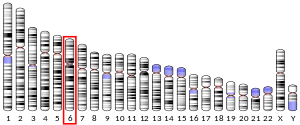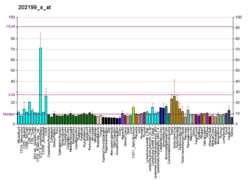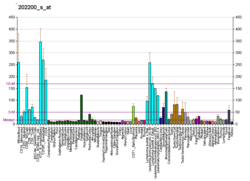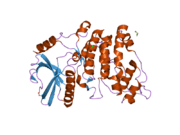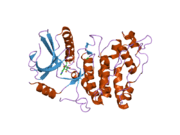SRPK1
Serine/threonine-protein kinase SRPK1 is an enzyme that in humans is encoded by the SRPK1 gene.[5][6][7]
Function
This gene encodes a serine/arginine protein kinase specific for the SR (serine/arginine-rich domain) family of splicing factors. The protein localizes to the nucleus and the cytoplasm. It is thought to play a role in regulation of both constitutive and alternative splicing by regulating intracellular localization of splicing factors. A second alternatively spliced transcript variant for this gene has been described, but its full length nature has not been determined.[7]
Possible anti-cancer target
Some cancers are vascular endothelial growth factor (VEGF) dependant (for angiogenesis). SRPK1 activates (phosphorylates) VEGF splicing factor. SRPK1 inhibitors (e.g. 'SPHINX compounds' [8]) are being investigated as treatments for prostate cancer.[9][10]
SRPK1 enables angiogenesis, which is regulated by VEGF, which either initiates or inhibits vessel formation depending on alternative splicing. In human prostate cancer, levels of SRPK1 rose as a cancer becomes more aggressive. In a mouse model three doses per week of drugs designed to inhibit SRPK1 activity inhibitef tumor vasculature and growth.[11]
Interactions
SRPK1 has been shown to interact with:
References
- 1 2 3 GRCh38: Ensembl release 89: ENSG00000096063 - Ensembl, May 2017
- 1 2 3 GRCm38: Ensembl release 89: ENSMUSG00000004865 - Ensembl, May 2017
- ↑ "Human PubMed Reference:".
- ↑ "Mouse PubMed Reference:".
- ↑ Gui JF, Lane WS, Fu XD (Jul 1994). "A serine kinase regulates intracellular localization of splicing factors in the cell cycle". Nature. 369 (6482): 678–82. PMID 8208298. doi:10.1038/369678a0.
- ↑ Wang HY, Arden KC, Bermingham JR, Viars CS, Lin W, Boyer AD, Fu XD (May 1999). "Localization of serine kinases, SRPK1 (SFRSK1) and SRPK2 (SFRSK2), specific for the SR family of splicing factors in mouse and human chromosomes". Genomics. 57 (2): 310–5. PMID 10198174. doi:10.1006/geno.1999.5770.
- 1 2 "Entrez Gene: SRPK1 SFRS protein kinase 1".
- ↑ Development of novel anti-angiogenic SRPK1 inhibitors
- ↑ Molecular breakthrough could halt spread of prostate cancer
- ↑ Mavrou A, Brakspear K, Hamdollah-Zadeh M, Damodaran G, Babaei-Jadidi R, Oxley J, Gillatt DA, Ladomery MR, Harper SJ, Bates DO, Oltean S (2014). "Serine-arginine protein kinase 1 (SRPK1) inhibition as a potential novel targeted therapeutic strategy in prostate cancer.". Oncogene. 34: 4311–9. PMC 4351909
 . PMID 25381816. doi:10.1038/onc.2014.360.
. PMID 25381816. doi:10.1038/onc.2014.360. - ↑ Lavars, Nick (November 11, 2014). "Targeting a single molecule may stop prostate cancer in its tracks". www.gizmag.com. Retrieved 2016-04-10.
- 1 2 Wang HY, Lin W, Dyck JA, Yeakley JM, Songyang Z, Cantley LC, Fu XD (Feb 1998). "SRPK2: a differentially expressed SR protein-specific kinase involved in mediating the interaction and localization of pre-mRNA splicing factors in mammalian cells". J. Cell Biol. 140 (4): 737–50. PMC 2141757
 . PMID 9472028. doi:10.1083/jcb.140.4.737.
. PMID 9472028. doi:10.1083/jcb.140.4.737. - ↑ Lukasiewicz R, Velazquez-Dones A, Huynh N, Hagopian J, Fu XD, Adams J, Ghosh G (Aug 2007). "Structurally unique yeast and mammalian serine-arginine protein kinases catalyze evolutionarily conserved phosphorylation reactions". J. Biol. Chem. 282 (32): 23036–43. PMID 17517895. doi:10.1074/jbc.M611305200.
- ↑ Umehara H, Nishii Y, Morishima M, Kakehi Y, Kioka N, Amachi T, Koizumi J, Hagiwara M, Ueda K (Feb 2003). "Effect of cisplatin treatment on speckled distribution of a serine/arginine-rich nuclear protein CROP/Luc7A". Biochem. Biophys. Res. Commun. 301 (2): 324–9. PMID 12565863. doi:10.1016/s0006-291x(02)03017-6.
- ↑ Koizumi J, Okamoto Y, Onogi H, Mayeda A, Krainer AR, Hagiwara M (Apr 1999). "The subcellular localization of SF2/ASF is regulated by direct interaction with SR protein kinases (SRPKs)". J. Biol. Chem. 274 (16): 11125–31. PMID 10196197. doi:10.1074/jbc.274.16.11125.
- ↑ Kamachi M, Le TM, Kim SJ, Geiger ME, Anderson P, Utz PJ (Nov 2002). "Human autoimmune sera as molecular probes for the identification of an autoantigen kinase signaling pathway". J. Exp. Med. 196 (9): 1213–25. PMC 2194102
 . PMID 12417631. doi:10.1084/jem.20021167.
. PMID 12417631. doi:10.1084/jem.20021167. - ↑ Varjosalo, Markku; Keskitalo, Salla; Van Drogen, Audrey; Nurkkala, Helka; Vichalkovski, Anton; Aebersold, Ruedi; Gstaiger, Matthias (April 2013). "The Protein Interaction Landscape of the Human CMGC Kinase Group". Cell Reports. 3 (4): 1306–1320. PMID 23602568. doi:10.1016/j.celrep.2013.03.027.
Further reading
- Colwill K, Feng LL, Yeakley JM, Gish GD, Cáceres JF, Pawson T, Fu XD (1996). "SRPK1 and Clk/Sty protein kinases show distinct substrate specificities for serine/arginine-rich splicing factors". J. Biol. Chem. 271 (40): 24569–75. PMID 8798720. doi:10.1074/jbc.271.40.24569.
- Wang HY, Lin W, Dyck JA, Yeakley JM, Songyang Z, Cantley LC, Fu XD (1998). "SRPK2: A Differentially Expressed SR Protein-specific Kinase Involved in Mediating the Interaction and Localization of Pre-mRNA Splicing Factors in Mammalian Cells". J. Cell Biol. 140 (4): 737–50. PMC 2141757
 . PMID 9472028. doi:10.1083/jcb.140.4.737.
. PMID 9472028. doi:10.1083/jcb.140.4.737. - Papoutsopoulou S, Nikolakaki E, Giannakouros T (1999). "SRPK1 and LBR protein kinases show identical substrate specificities". Biochem. Biophys. Res. Commun. 255 (3): 602–7. PMID 10049757. doi:10.1006/bbrc.1999.0249.
- Koizumi J, Okamoto Y, Onogi H, Mayeda A, Krainer AR, Hagiwara M (1999). "The subcellular localization of SF2/ASF is regulated by direct interaction with SR protein kinases (SRPKs)". J. Biol. Chem. 274 (16): 11125–31. PMID 10196197. doi:10.1074/jbc.274.16.11125.
- Paillard F (1999). "A novel soluble chimera for the treatment of familial hypercholesterolemia". Hum. Gene Ther. 10 (7): 1093–4. PMID 10340541. doi:10.1089/10430349950018085.
- Papoutsopoulou S, Nikolakaki E, Chalepakis G, Kruft V, Chevaillier P, Giannakouros T (1999). "SR protein-specific kinase 1 is highly expressed in testis and phosphorylates protamine 1". Nucleic Acids Res. 27 (14): 2972–80. PMC 148514
 . PMID 10390541. doi:10.1093/nar/27.14.2972.
. PMID 10390541. doi:10.1093/nar/27.14.2972. - Nikolakaki E, Kohen R, Hartmann AM, Stamm S, Georgatsou E, Giannakouros T (2001). "Cloning and characterization of an alternatively spliced form of SR protein kinase 1 that interacts specifically with scaffold attachment factor-B". J. Biol. Chem. 276 (43): 40175–82. PMID 11509566. doi:10.1074/jbc.M104755200.
- Daub H, Blencke S, Habenberger P, Kurtenbach A, Dennenmoser J, Wissing J, Ullrich A, Cotten M (2002). "Identification of SRPK1 and SRPK2 as the Major Cellular Protein Kinases Phosphorylating Hepatitis B Virus Core Protein". J. Virol. 76 (16): 8124–37. PMC 155132
 . PMID 12134018. doi:10.1128/JVI.76.16.8124-8137.2002.
. PMID 12134018. doi:10.1128/JVI.76.16.8124-8137.2002. - Kamachi M, Le TM, Kim SJ, Geiger ME, Anderson P, Utz PJ (2003). "Human Autoimmune Sera as Molecular Probes for the Identification of an Autoantigen Kinase Signaling Pathway". J. Exp. Med. 196 (9): 1213–25. PMC 2194102
 . PMID 12417631. doi:10.1084/jem.20021167.
. PMID 12417631. doi:10.1084/jem.20021167. - Mylonis I, Giannakouros T (2003). "Protein kinase CK2 phosphorylates and activates the SR protein-specific kinase 1". Biochem. Biophys. Res. Commun. 301 (3): 650–6. PMID 12565829. doi:10.1016/S0006-291X(02)03055-3.
- Aubol BE, Chakrabarti S, Ngo J, Shaffer J, Nolen B, Fu XD, Ghosh G, Adams JA (2004). "Processive phosphorylation of alternative splicing factor/splicing factor 2". Proc. Natl. Acad. Sci. U.S.A. 100 (22): 12601–6. PMC 240664
 . PMID 14555757. doi:10.1073/pnas.1635129100.
. PMID 14555757. doi:10.1073/pnas.1635129100. - Li J, Hawkins IC, Harvey CD, Jennings JL, Link AJ, Patton JG (2003). "Regulation of Alternative Splicing by SRrp86 and Its Interacting Proteins". Mol. Cell. Biol. 23 (21): 7437–47. PMC 207616
 . PMID 14559993. doi:10.1128/MCB.23.21.7437-7447.2003.
. PMID 14559993. doi:10.1128/MCB.23.21.7437-7447.2003. - Mylonis I, Drosou V, Brancorsini S, Nikolakaki E, Sassone-Corsi P, Giannakouros T (2004). "Temporal association of protamine 1 with the inner nuclear membrane protein lamin B receptor during spermiogenesis". J. Biol. Chem. 279 (12): 11626–31. PMID 14701833. doi:10.1074/jbc.M311949200.
- Lee CG, Hague LK, Li H, Donnelly R (2004). "Identification of toposome, a novel multisubunit complex containing topoisomerase IIalpha". Cell Cycle. 3 (5): 638–47. PMID 15034300. doi:10.4161/cc.3.5.825.
- Jin J, Smith FD, Stark C, Wells CD, Fawcett JP, Kulkarni S, Metalnikov P, O'Donnell P, Taylor P, Taylor L, Zougman A, Woodgett JR, Langeberg LK, Scott JD, Pawson T (2004). "Proteomic, functional, and domain-based analysis of in vivo 14-3-3 binding proteins involved in cytoskeletal regulation and cellular organization". Curr. Biol. 14 (16): 1436–50. PMID 15324660. doi:10.1016/j.cub.2004.07.051.

